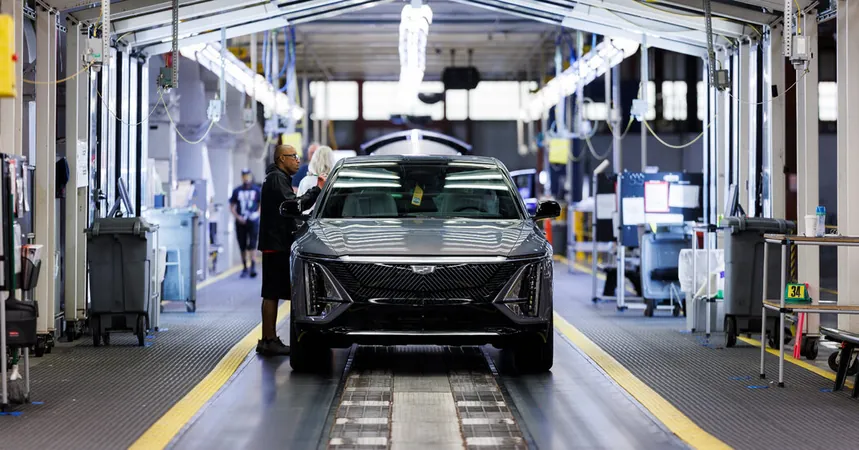
Auto Sales Skyrocket Ahead of Trump’s Major Tariff Announcement!
2025-04-01
Author: Wei
Unexpected Surge in Auto Sales
In an unexpected twist during March, the U.S. auto industry experienced a surge in sales as buyers rushed to dealerships, eager to secure vehicles before President Trump’s impending tariffs could cause prices to soar. Industry executives reported that the urgency among consumers to take advantage of current prices led to a dramatic uptick in vehicle sales.
Statements from Industry Executives
Randy Parker, CEO of Hyundai Motor North America, remarked, “This past weekend was by far the best weekend I’ve seen in a very long time.” The company proudly announced a remarkable 13% increase in sales for March compared to the same month last year.
Ford Motor Company also joined the party, revealing that its dealership sales jumped 19% in March. Nevertheless, Ford's overall sales for the quarter fell slightly by 1%, totaling around 500,000 vehicles, largely due to a drop in sales to fleet customers.
General Motors' Performance
General Motors (GM) continued to ride the upward trend, reporting a staggering 17% increase in first-quarter sales year-over-year, reaching 693,000 vehicles. While the company did not disclose separate figures for March, it’s clear that the excitement in the market was palpable.
Tariffs Announcement and Impact
The catalyst for this sales frenzy? President Trump announced 25% tariffs on imported vehicles effective Thursday, with additional tariffs on auto parts scheduled to take effect on May 3. These tariffs could compel car manufacturers to hike prices by as much as $10,000 for certain models, as many cars produced in the U.S. contain parts sourced from overseas.
Growth in Electric and Hybrid Vehicles
Amidst traditional combustion engine sales, a notable pattern emerged with electric and hybrid vehicles showing spectacular growth. GM reported that its sales of battery-powered vehicles nearly doubled to an impressive 32,000 cars, fueled by the release of the all-electric Equinox SUV. Priced starting at approximately $35,000, this model is gaining traction as one of the most affordable electric options in America.
Toyota mirrored this trend, announcing a staggering 44% rise in hybrid and electric vehicle sales in North America for March, accounting for nearly half of its total sales with 113,000 units sold. Despite dominating the hybrid market, Toyota remains relatively minor in the fully electric segment and seems eager to expand its electric offerings.
Ford reported a 33% increase in hybrid vehicle sales during the first quarter, while electric models like the Mustang Mach-E saw a 12% rise. However, cars reliant solely on internal combustion engines experienced a 5% decline in sales.
Hyundai proactive in embracing eco-friendly technology, highlighted an impressive 68% surge in quarterly sales of hybrid vehicles. Sales of pure electric models also inched up by 3%. German luxury automaker BMW experienced a 26% leap in its electric vehicle sales, contributing to an overall sales increase of 4% in the U.S. during the first quarter.
Future Pricing Concerns
As the market braces for price hikes due to the new tariffs, Parker cautioned about the impact on future pricing strategies. While Hyundai and its affiliate Kia produce numerous vehicles stateside, they also import a significant number from South Korea. "We haven’t made any firm decisions yet," remarked Parker, emphasizing the urgency: "Don’t wait to buy tomorrow what you can buy today."
Conclusion
This unexpected surge in the auto industry has left consumers and analysts alike pondering the future as the landscape rapidly shifts amidst geopolitical and economic changes.





 Brasil (PT)
Brasil (PT)
 Canada (EN)
Canada (EN)
 Chile (ES)
Chile (ES)
 Česko (CS)
Česko (CS)
 대한민국 (KO)
대한민국 (KO)
 España (ES)
España (ES)
 France (FR)
France (FR)
 Hong Kong (EN)
Hong Kong (EN)
 Italia (IT)
Italia (IT)
 日本 (JA)
日本 (JA)
 Magyarország (HU)
Magyarország (HU)
 Norge (NO)
Norge (NO)
 Polska (PL)
Polska (PL)
 Schweiz (DE)
Schweiz (DE)
 Singapore (EN)
Singapore (EN)
 Sverige (SV)
Sverige (SV)
 Suomi (FI)
Suomi (FI)
 Türkiye (TR)
Türkiye (TR)
 الإمارات العربية المتحدة (AR)
الإمارات العربية المتحدة (AR)